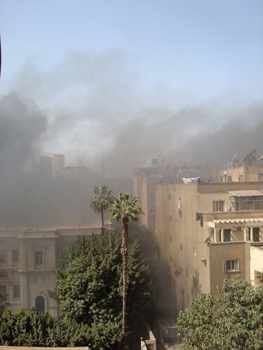Safety Abroad: Student Talks of Evacuating Egypt During Political Protests
July 12, 2011
Published: March 2, 2011
“At one point you could smell the tear gas from our apartment,” said Raquel Colon, Fordham College at Lincoln Center (FCLC) ’10. “A lot of people were wounded. When we looked outside of our building one night, we could see people throwing stones from the top of this building and the police would shoot up gas canisters and bullets. It was very scary.”

Colon studied abroad last semester at the American University in Cairo (AUC), taking pre-requisites for a master’s degree. She lived in an apartment in downtown Cairo during the height of the protests in Egypt, so close to Tahrir Square that she could hear the protestors’ shouts from her window, and across from the Interior Ministry, where she saw snipers standing on the roof of the building.
Egypt’s lines of communication have been down since the protests began, leaving Colon without phone or Internet access to gain help or information. Though AUC kept their website running, they only warned students from joining the protestors.
“Meanwhile, Fordham couldn’t get in touch with me. When I checked my e-mail I didn’t get much information either, so it was kind of like, ‘Do we run? Like, where do we go?’”
Consequently, Colon contacted a family member working for the U.S. State Department to register for the U.S. Embassy and get information on how to leave for Athens.
The protests in Egypt have made headlines since late January, as civilians were demonstrating to impeach former President Hosni Mubarak. Colon was one of many American students forced to evacuate because of the violence during what Egyptians are calling, “The Jan. 25 Revolution.”
Initially, Colon hardly left her apartment, only walking in her immediate area for water and food. But she soon had to take more serious measures to ensure her safety. “The thing that was the turning point of it all was the day that the Interior Ministry was abandoned. We heard jets so close to the ground that when they went by, our windows would shake.” Her neighbors feared being bombed and it was then that Colon tried to leave the country.
The Fordham webpage for studying abroad lists information about affiliated programs and tips for students and their parents on how to stay safe while overseas. Furthermore, they check websites for the U.S. State Department, Overseas Advisory Council and the Center of Disease Control, looking out for travel warnings that discourage people from going to places of political or environmental unrest to proactively prevent conflict.
Ronald Mendez-Clark, director of International and Study Abroad Programs said, “Study abroad programs are done in safe places. Things however can become unsafe for a number of reasons, sometimes political, sometimes it could be natural causes. When that happens, programs are prepared to handle the situation responsibly.” Mendez-Clark also said that students are not alone while abroad, noting that there are officials at host institutions mandated to guarantee students’ safety.
However, Colon said that aside from occasional, vague e-mails with sometimes-incorrect information from AUC, she did not receive enough help from either Fordham or AUC.
“I felt like Fordham and AUC really dropped the ball in getting in contact with students, because not all of the students live in the dorms. They were aware of that because when you register as an international student, you give your address. I wish they had done more, but obviously, it was very, very difficult.”
“In most cases, people are advised not to travel… because the situation might not be safe but it is not deemed so dangerous that they need to evacuate students,” Mendez-Clark said.
But because of the protests, Egypt was an exception. Colon took a plane to Athens, then to Italy, where she stayed until the protests calmed down.
Now Colon is back at her Cairo apartment. She wants to go back to AUC, but because the travel warning against Egypt has not been lifted, Fordham terminated her study abroad agreement, preventing her from attending classes. Phone lines are still down, and in our interview through Skype, she explained that she communicates with her family through e-mail. Colon is staying in Egypt to continue working in the art industry to become a curator.
She describes the city as cleaner than ever, energized with victory and hope for the future. “Things did get better. There were fireworks out there, there were people dancing, everyone is so happy and so proud. It is a very emotional day; it’s like Times Square at New Year’s.”
As serious as the events in Egypt were, Mendez-Clark said that this would not be the last time that Fordham students are sent to Egypt. “Countries have ways of getting back to normal quickly, and the same thing happens with study abroad. It is not as if things are disrupted and we have to wait months and months. In the case of Egypt, we are talking a semester, because it is happening now, and the semester has started. So summer, or the fall semester, the situation can go back to normal.”








